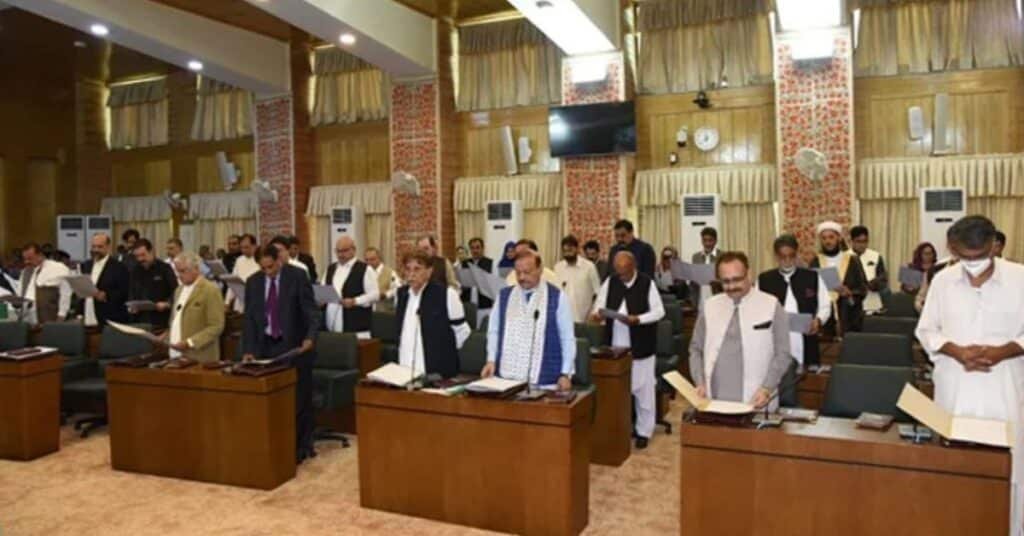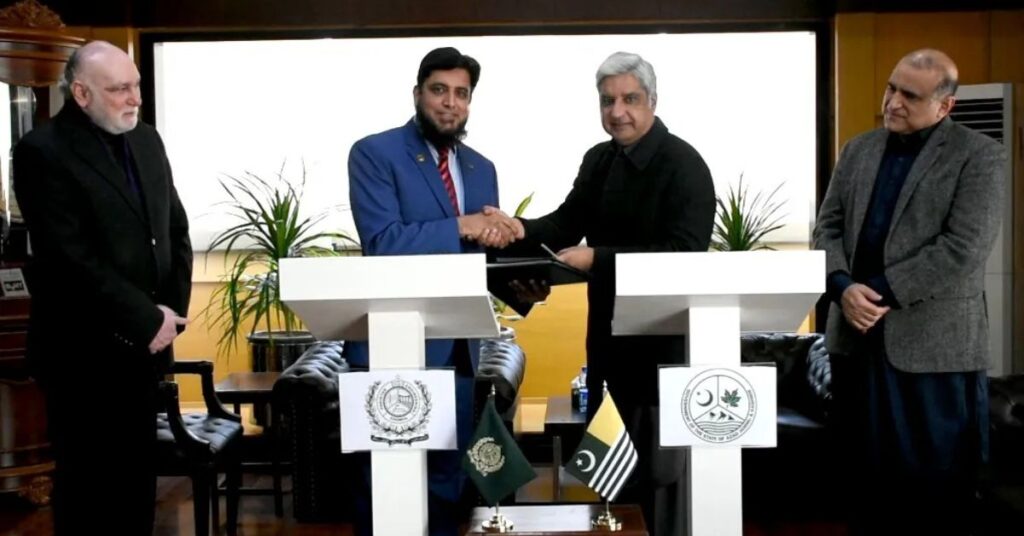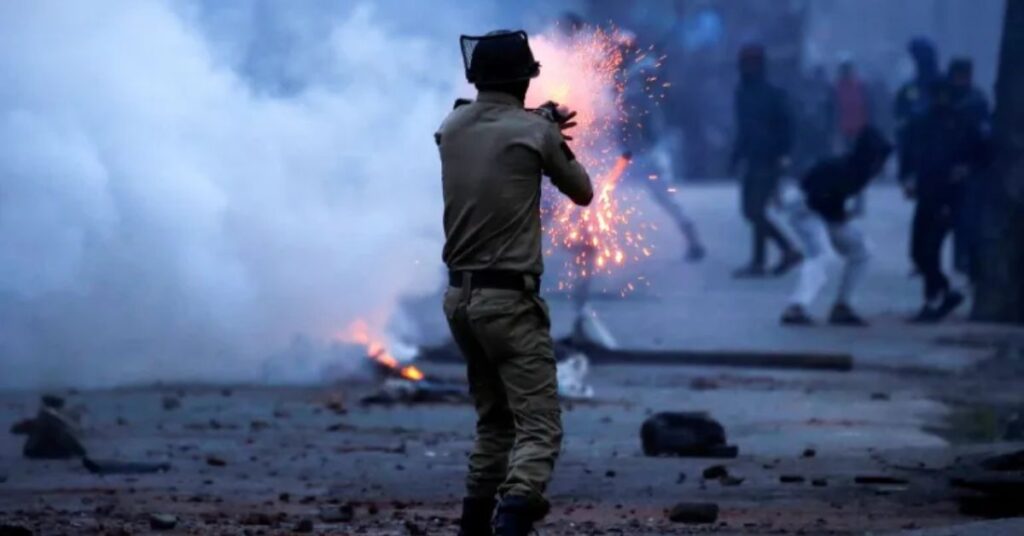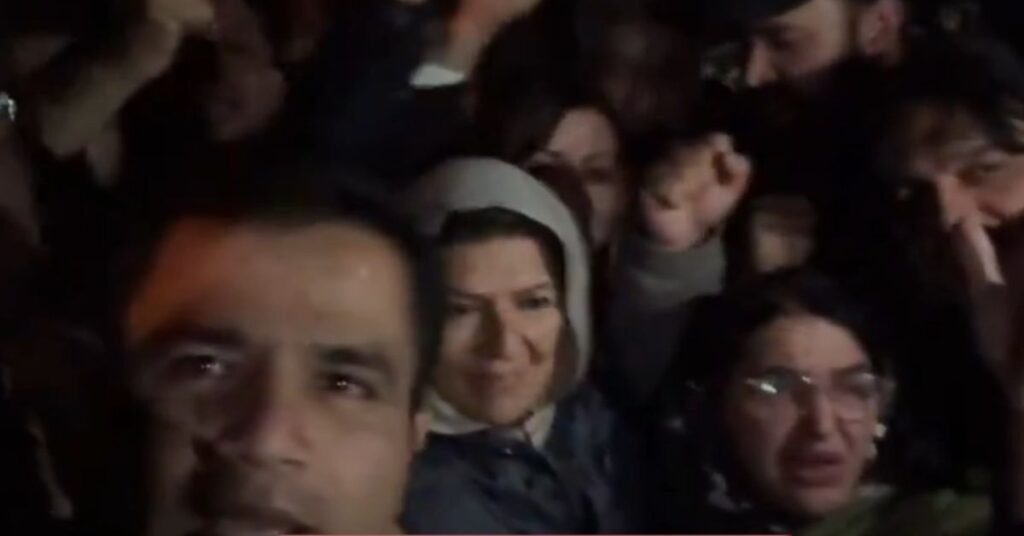By: Zulfiqar Ali (Kashmir Investigation Team)
MUZAFFARABAD: After decades of silence, the Azad Jammu and Kashmir Legislative Assembly has suddenly formed a “special committee” on the Kashmir issue, which some critics believe is a political spectacle rather than a concern for the plight of the Kashmiri people.
They sarcastically named it the “Foreign Trips Committee” because, according to them, its real purpose is to provide justification for foreign trips for members of the Azad Kashmir Assembly.
The Speaker, elected by 19 votes in the 53-member house, heads this committee, while the seven members include two former prime ministers, the leader of the opposition, ministers, and members. Some of those included in this committee have been in this assembly for decades.
The formation of this committee was announced in a notification issued by the Assembly Secretariat on August 18, 2025. Interestingly, this committee was formed six years after the abrogation of Kashmir’s special status and its subordination to Delhi.
The notification claimed that this committee was formed in its meeting on August 5, 2025, for the purpose of “reviewing the current situation in occupied Jammu and Kashmir and the recent developments related to the Kashmir issue.”
It also said that this committee will also review the steps taken by India to abrogate the special status of occupied Jammu and Kashmir on August 5, 2019, and divide occupied Jammu and Kashmir into Union Territories in violation of UN resolutions.
In addition, the notification states that “this committee will formulate recommendations to make the efforts to obtain a plebiscite in accordance with the resolutions of the United Nations Security Council and to highlight the Kashmir issue at international forums more effectively and efficiently, and will present its report in the House as soon as possible.”
It also states that the special committee will submit its recommendations to the government of Pakistan in this regard after consulting the leaders of the All Parties Hurriyat Conference (APHC) and the Prime Minister of the Azad Jammu and Kashmir government.
But analysts say that the establishment of this committee after 77 years shows the insensitive nature of the political elite of Azad Kashmir.
According to them, the claims of this elite are simply hollow and meaningless, which have no seriousness, and neither do they have any justification or moral credibility left to claim that they are the spokespersons of Kashmir, because they have completely lost the trust of the people of both sides of Kashmir.
They say they are using the Kashmir issue as a pretext to pursue their personal and political interests.
Half a century of silence
Just consider that for 51 years, since the assembly was formed in 1974, the assembly has never reviewed the situation in Indian-occupied Kashmir or made any recommendations on the Kashmir issue.
When armed struggle broke out in Indian-occupied Kashmir in 1988, the situation quickly escalated. India turned Kashmir into a military cantonment and deployed nearly a million troops. The region witnessed day-and-night curfews, prolonged sieges, and search operations — known as “cordon and search operations.”
There were incidents of house raids, massacres, mass rapes, mass disappearances, mass arrests, and eye-gouging with pellet guns. But the political elite of Pakistan-administered Kashmir did not feel the need to form a committee in the assembly.
The Azad Kashmir Assembly remained silent during major public protests in the Kashmir Valley in 2008 and 2010. The situation in the Kashmir Valley became more serious when the Indian army killed Burhan Wani on July 8, 2016.
This was followed by a 120-day siege and India’s infamous pellet war in the Kashmir Valley. In the first 34 days alone, about 10,000 people were injured, 17 were killed, and 1,000 people were completely or partially blinded by pellets. The whole world cried out over this situation, but despite all this, there was complete silence from the Azad Jammu and Kashmir government, its assembly, and the political elite.
In November 2016, the then Prime Minister of Azad Jammu and Kashmir (AJK) announced that a fund had been set up for the treatment of pellet victims, but the fact is that this fund was never set up.
The silence of the political elite of Azad Kashmir continued.
On August 4, 2019, at 10 pm, a deathly silence fell over Kashmir. The only sound that could be heard on the streets and roads was the clatter of Indian soldiers’ boots. The entire Kashmir was under siege. An additional 200,000 soldiers were deployed in addition to the 700,000 already in place. Kashmir’s 150 million population was thus confined to their homes.
The internet and telephones were shut down, the movement of journalists was restricted, and everyone—from newborns to centenarians—became hostages. Armed soldiers stood outside their homes, ready to shoot anyone who came out.
On August 5, 2019, India revoked Article 370, which guaranteed Kashmir’s special status, and scrapped Article 35-A, which prevented non-Kashmiris from buying land in Kashmir. This move paved the way for demographic change.
India divided Jammu and Kashmir into two union territories and placed them under the direct control of Delhi. In the following days, the Indian army carried out late-night attacks on homes and abducted 40,000 Kashmiri youth.
On August 15, 2019, the American organization “Genocide Watch” issued a genocide alert that the threat of genocide was looming in Kashmir and appealed to UN member states to stop this possible genocide. But due to restrictions on the media and the shutdown of the internet and phones, the news was not coming out.
Even if the Indian military had been using tanks or helicopters, the world would not have known. Global concern grew. Governments, human rights organizations, and international activists condemned it. But the political elite of Azad Kashmir remained completely silent. Let alone forming a committee in the assembly.
The political elite of Azad Kashmir justified their silence by saying that they were local authorities and could not speak for the besieged people of the Kashmir Valley. This was said at a time when the small population of the valley was at risk of genocide.
This silence continued until May 2024. In May 2024, the people of Azad Kashmir rose up against the political and administrative elite of the region for their rights. After this protest, the political elite of Azad Kashmir once again started making statements on Kashmir, which, according to analysts, was aimed at diverting attention from the public anger against them.
Analysts say that the formation of the committee in the assembly is also a futile attempt to divert attention from the public anger, protect political and personal interests, and pave the way for foreign visits.
Analysts say that journalists, human rights activists, experts, teachers, researchers, and historians from the Kashmir Valley have published dozens of books, thousands of articles, research papers, and reports on Kashmir before and after 2019. The international media have published or broadcast documentaries and reports.
In addition, analysts say that international human rights organizations have also published dozens of reports. The United Nations published two reports in 2018 and 2019. They say that how will an assembly that is unaware of Indian atrocities on the Line of Control assess the situation in the Kashmir Valley, then what will they know about the Kashmir Valley?
They say that Pakistan itself is unaware of the situation, when it has already published a dossier on Kashmir?
80 sessions of the Azad Kashmir Assembly, zero action
According to the documents of the Azad Kashmir Assembly, more than 80 sessions of the Azad Kashmir Assembly have been held since July 2016, and almost all of them were held under constitutional necessity. Not a single session was dedicated to discussing the Kashmir issue.
However, the Azad Kashmir Assembly holds two special sessions in Kashmir every year: one on February 5 (Kashmir Solidarity Day) and the other on August 5.
Critics say that ithis s also because the Prime Minister of Pakistan attends them and on these occasions the political elite of Pakistan-administered Kashmir presents itself as the representative of the entire Jammu and Kashmir. They say this is a misleading and illegal claim. Apart from these formal gatherings, the assembly played no real role.
The main focus of the political elite of Azad Kashmir was on its privileges.
According to the documents, from 2017 to 2023, the Azad Kashmir Assembly increased the privileges and salaries of the Prime Minister, President, Speaker, former Speaker, former Prime Ministers, former Presidents, Ministers, and Members of the Assembly a total of eight times at different times.
According to the documents, from 2016 to 2023, the Azad Kashmir government spent Rs 2 billion on luxury vehicles alone. This was happening at a time when civilians were being killed, injured, and disabled by the Indian army on both sides of the Line of Control.
Forgotten Line of Control
From 1990 to 2021, India used mortars, cluster bombs, sniper rifles, and artillery against the civilian population of Azad Kashmir.
Thousands of people were killed or injured as a result of Indian firing, properties were destroyed, schools, hospitals, and jobs were destroyed. But the Azad Kashmir government, assembly, or any other government body has never documented these attacks on scientific grounds to present as evidence against India.
Government records only mention the number of deaths and injuries, and the victims are listed as mere numbers. The record of civilians martyred from 1990 to 1997 is also not available because the authorities say that this record was “lost”.
During the continuous firing on the civilian population of Azad Kashmir along the Line of Control from 1990 to 2021, hardly any Azad Kashmir politician went to console the affected families. They remained sitting in Islamabad, while people were dying on the LoC.
Even the so-called “Liberation Cell”, which was formed for the Kashmir cause, was limited to just collecting salaries.
Critics say that since the armed struggle in Kashmir began, the political and administrative elite of Pakistan-administered Kashmir has used the Kashmir cause as a pretext for their privileges, expensive cars, corruption, and foreign trips.
Prime Ministers, presidents, ministers, and members of the assembly kept going abroad again and again, but not a single document or report on Kashmir was brought with them because these trips were not for the sake of the Kashmir issue but for sightseeing.
No mandate, no justification
Analysts say the special committee on Kashmir formed in the Azad Kashmir Assembly in 2025 has no justification for two reasons.
They say, “First, the Azad Kashmir Assembly has always completely ignored Indian atrocities on both sides of the Line of Control and turned its back on the victims of Indian violence. Second, the people of Indian-administered Kashmir have not been consulted.
The members of the committee are not their elected representatives. They have no mandate. Their silence at the worst moments of history has not gone unnoticed. Many Kashmiris call these representatives opportunists, insensitive, selfish, and complicit in decades of oppression.
The formation of the committee on Kashmir in the Azad Kashmir Assembly is the last resort of the region’s political elite to save privileges, block criticism, and travel abroad.




